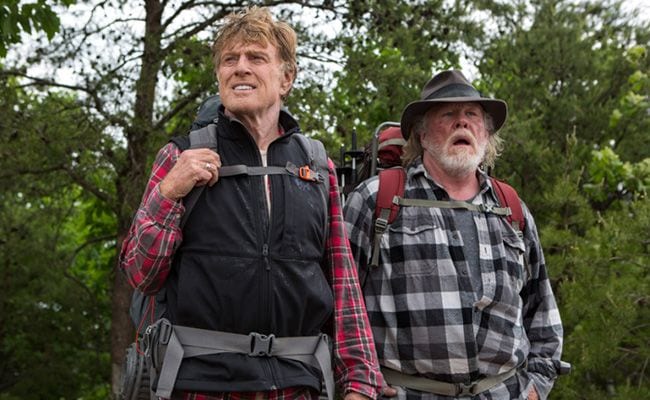
“Everyone thinks we’re going to go out on the trail and quit after a week, like most people.” Bill Bryson (Robert Redford) sounds a bit defiant here, but he’s also trying to get a feel for Stephen (Nick Nolte), to see whether he means to take up the challenge of “everyone’s” expectations. Stephen says exactly the right thing: “We’re not most people.”
So they might think. But even as Stephen and Bill reassure each other that they’ll walk the Appalachian Trail, thereby demonstrating that their youth isn’t so lost as it seems, that their bodies maintain some resemblance to their memories, you see otherwise. Their mutual delusion is charming and annoying in the way that such delusions are charming and annoying in movies with cute soundtracks and episodic plot structures. You won’t be surprised to hear that A Walk in the Woods features a snowstorm and a rainstorm, a run-in with an angry husband, and a couple of diner scenes. You also know that the former college classmates, world travelers, and drinking buddies who have long since lost touch will fight and make up and fight again, and also come to heartfelt realizations about the world and one another and themselves.
This all makes them a lot like “most people”, or at least a lot like most people in movies like this one. These would be movies where people walk in the wilderness or where old men are grumpy. As it bridges this spectrum, A Walk in the Woods is a test of limits. It’s not that you begrudge Stephen and Bill finding themselves, but it would be easier to take without the running gags (super-hikers who embarrass and then rescue the old guys, bears they imagine and then encounter, bad weather reports they disdain and then must face). The most persistent of these has to do with the movie’s source, the real life Bryson’s memoir: Stephen repeatedly advises his friend to put this or that event “in the book”, and Bill repeatedly tells him — and you — that “there is no book”, even though you know there is. It’s not even funny the first time.
Neither is it particularly pleasant that the movie based on the book takes up the tedious trope of the wife who waits at home. When Bill proposes his adventure, following their attendance at a friend’s funeral, Catherine (Emma Thompson) sees it for what it might be, an effort to stave of dying. She takes to Google, finding horror stories of hikers killed by accidents, bad health, and bears, leaving them as print-outs for her husband who does, it appears, use a computer to do his travel writing (that is, his career). Catherine’s role is much as you expect: she argues, she frets, she hugs warmly and turns misty-eyed, and she relents — even after she sees Stephen, who looks and wheezes as if he’s twice as old as her 78-year-old husband.
While you might find yourself musing how much more interesting it might have been to watch Emma Thompson walking in the woods for a couple of hours, you might also be distracted by the film’s presentation of the Appalachian Trail per se. Certainly, it’s a business, with pricey hotels and gear and food stops, not to mention safety guidelines and structures designed to appeal to amateur hikers. The film finds some minor comedy in these bits, but mostly leaves it to you to sort out how you might feel about the wilderness industry, so large and so profitable, so abjectly commercial in spite or because of what it’s selling (you know, like the movie).
The movie is less trusting of your judgment when it comes to Stephen and Bill’s specific spiritual and psychic needs and how these might be met on the trail so many people pay to use. Even out here in the woods, where the guys are communing with themselves, they’re inclined to work through their worries over lost time and lost resilience via encounters with women. Crabby, insular, and passive for the first third of their journey, they’re moved to take action when they meet Mary Ellen (Kristen Schaal), self-absorbed and chatty: when the men connive to lose her on the trail, it’s their first joint decision, perversely heroic.
Near-romantic encounters for each man — Bill with a sweetly flirtatious hotel keeper (Mary Steenburgen) and Stephen with a more overtly provocative woman he meets in a Laundromat (Susan McPhail) (“She’s got a beautiful body,” he explains to Bill, “But it’s buried under 200 pounds of fat”) suggest the men seek confirmation of their manly man-ness in the usual road-trip-movie fashion. Whether or not these episodes end with punchlines, they don’t exactly press boundaries for originality or inspiration.
If only, if only, you may find yourself thinking as the men walk and the movie trudges, Emma Thompson showed up on the trail, enchanted, transformed into a bear, as she was in Brave. You know, she was not like most people.


![Call for Papers: All Things Reconsidered [MUSIC] May-August 2024](https://www.popmatters.com/wp-content/uploads/2024/04/all-things-reconsidered-call-music-may-2024-720x380.jpg)



